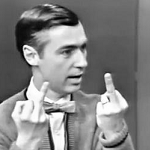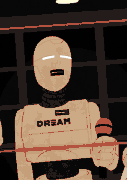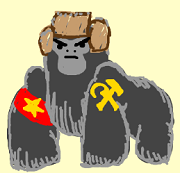|
Here are the rules: 1. Propose a new catchphrase OR 2. Emptyquote the one you like best. After 10 pages, whichever catchphrase has the most empty quotes will win and become the next Great GBS Catchphrase! All posters will be required to include it in the OP of a thread or else they will be Permabanned. I suggest "Cucktane." Cuck because of its already long and glorious history in GBS, combined with "tane" which is a slang term for "gasoline" as used in the CCR song "Proud Mary." You would use it to refer to alcohol imbibed to gain the courage to ask someone to gently caress your SO, like this: "I want to ask a black man to gently caress my wife, but I'm feeling nervous. Better fill up on cucktane first." This will be a great way to keep GBS's catchphrases fresh AND to make sure that only the best ones get adopted. GO! edit: Some really great responses in this thread! But let me suggest that you guys should explain the catchphrase, its meaning and why it's funny. That way, everybody can enjoy a good laugh even if they don't "get it". Inevitable fucked around with this message at 05:38 on Apr 13, 2015 |
|
|
|

|
| # ? Apr 26, 2024 07:23 |
|
I'm gay.
|
|
|
|
schnikes!
|
|
|
|
coldplay chiptunes posted:I'm gay.
|
|
|
|
Jinkies!
|
|
|
|
something something... CARAMEL MACCHIATO... something.
|
|
|
|
im hornier then a 90's ska band
|
|
|
|
smooth move exlax
|
|
|
|
Jim rustler
|
|
|
|
Cithen posted:something something... CARAMEL MACCHIATO... something. THIS
|
|
|
|
I'm not straight.
|
|
|
|
Too Asian
|
|
|
|
Some really great responses in this thread! But let me suggest that you guys should explain the catchphrase, its meaning and why it's funny. That way, everybody can enjoy a good laugh even if they don't "get it".
|
|
|
|
Poetic Justice posted:im hornier then a 90's ska band Jim rustler
|
|
|
|
coldplay chiptunes posted:I'm gay.
|
|
|
|
Cithen posted:something something... CARAMEL MACCHIATO... something. My name is Caramel Macchiato. You killed my father, prepare to die.
|
|
|
|
For twelve years, you have been asking: Who is John Galt? This is John Galt speaking. I am the man who loves his life. I am the man who does not sacrifice his love or his values. I am the man who has deprived you of victims and thus has destroyed your world, and if you wish to know why you are perishing-you who dread knowledge -I am the man who will now tell you.” The chief engineer was the only one able to move; he ran to a television set and struggled frantically with its dials. But the screen remained empty; the speaker had not chosen to be seen. Only his voice filled the airways of the country-of the world, thought the chief engineer-sounding as if he were speaking here, in this room, not to a group, but to one man; it was not the tone of addressing a meeting, but the tone of addressing a mind. “You have heard it said that this is an age of moral crisis. You have said it yourself, half in fear, half in hope that the words had no meaning. You have cried that man’s sins are destroying the world and you have cursed human nature for its unwillingness to practice the virtues you demanded. Since virtue, to you, consists of sacrifice, you have demanded more sacrifices at every successive disaster. In the name of a return to morality, you have sacrificed all those evils which you held as the cause of your plight. You have sacrificed justice to mercy. You have sacrificed independence to unity. You have sacrificed reason to faith. You have sacrificed wealth to need. You have sacrificed self-esteem to self-denial. You have sacrificed happiness to duty. “You have destroyed all that which you held to be evil and achieved all that which you held to be good. Why, then, do you shrink in horror from the sight of the world around you? That world is not the product of your sins, it is the product and the image of your virtues. It is your moral ideal brought into reality in its full and final perfection. You have fought for it, you have dreamed of it, and you have wished it, and I-I am the man who has granted you your wish. “Your ideal had an implacable enemy, which your code of morality was designed to destroy. I have withdrawn that enemy. I have taken it out of your way and out of your reach. I have removed the source of all those evils you were sacrificing one by one. I have ended your battle. I have stopped your motor. I have deprived your world of man’s mind. “Men do not live by the mind, you say? I have withdrawn those who do. The mind is impotent, you say? I have withdrawn those whose mind isn’t. There are values higher than the mind, you say? I have withdrawn those for whom there aren’t. “While you were dragging to your sacrificial altars the men of justice, of independence, of reason, of wealth, of self-esteem-I beat you to it, I reached them first. I told them the nature of the game you were playing and the nature of that moral code of yours, which they had been too innocently generous to grasp. I showed them the way to live by another morality-mine. It is mine that they chose to follow. “All the men who have vanished, the men you hated, yet dreaded to lose, it is I who have taken them away from you. Do not attempt to find us. We do not choose to be found. Do not cry that it is our duty to serve you. We do not recognize such duty. Do not cry that you need us. We do not consider need a claim. Do not cry that you own us. You don’t. Do not beg us to return. We are on strike, we, the men of the mind. “We are on strike against self-immolation. We are on strike against the creed of unearned rewards and unrewarded duties. We are on strike against the dogma that the pursuit of one’s happiness is evil. We are on strike against the doctrine that life is guilt. “There is a difference between our strike and all those you’ve practiced for centuries: our strike consists, not of making demands, but of granting them. We are evil, according to your morality. We have chosen not to harm you any longer. We are useless, according to your economics. We have chosen not to exploit you any longer. We are dangerous and to be shackled, according to your politics. We have chosen not to endanger you, nor to wear the shackles any longer. We are only an illusion, according to your philosophy. We have chosen not to blind you any longer and have left you free to face reality-the reality you wanted, the world as you see it now, a world without mind. “We have granted you everything you demanded of us, we who had always been the givers, but have only now understood it. We have no demands to present to you, no terms to bargain about, no compromise to reach. You have nothing to offer us. We do not need you. “Are you now crying: No, this was not what you wanted? A mindless world of ruins was not your goal? You did not want us to leave you? You moral cannibals, I know that you’ve always known what it was that you wanted. But your game is up, because now we know it, too. “Through centuries of scourges and disasters, brought about by your code of morality, you have cried that your code had been broken, that the scourges were punishment for breaking it, that men were too weak and too selfish to spill all the blood it required. You damned man, you damned existence, you damned this earth, but never dared to question your code. Your victims took the blame and struggled on, with your curses as reward for their martyrdom-while you went on crying that your code was noble, but human nature was not good enough to practice it. And no one rose to ask the question: Good?-by what standard? “You wanted to know John Galt’s identity. I am the man who has asked that question. “Yes, this is an age of moral crisis. Yes, you are bearing punishment for your evil. But it is not man who is now on trial and it is not human nature that will take the blame. It is your moral code that’s through, this time. Your moral code has reached its climax, the blind alley at the end of its course. And if you wish to go on living, what you now need is not to return to morality-you who have never known any-but to discover it. “You have heard no concepts of morality but the mystical or the social. You have been taught that morality is a code of behavior imposed on you by whim, the whim of a supernatural power or the whim of society, to serve God’s purpose or your neighbor’s welfare, to please an authority beyond the grave or else next door-but not to serve your life or pleasure. Your pleasure, you have been taught, is to be found in immorality, your interests would best be served by evil, and any moral code must be designed not for you, but against you, not to further your life, but to drain it. “For centuries, the battle of morality was fought between those who claimed that your life belongs to God and those who claimed that it belongs to your neighbors-between those who preached that the good is self-sacrifice for the sake of ghosts in heaven and those who preached that the good is self-sacrifice for the sake of incompetents on earth. And no one came to say that your life belongs to you and that the good is to live it. “Both sides agreed that morality demands the surrender of your self-interest and of your mind, that the moral and the practical are opposites, that morality is not the province of reason, but the province of faith and force. Both sides agreed that no rational morality is possible, that there is no right or wrong in reason-that in reason there’s no reason to be moral. “Whatever else they fought about, it was against man’s mind that all your moralists have stood united. It was man’s mind that all their schemes and systems were intended to despoil and destroy. Now choose to perish or to learn that the anti-mind is the anti-life. “Man’s mind is his basic tool of survival. Life is given to him, survival is not. His body is given to him, its sustenance is not. His mind is given to him, its content is not. To remain alive, he must act, and before he can act he must know the nature and purpose of his action. He cannot obtain his food without a knowledge of food and of the way to obtain it. He cannot dig a ditch-or build a cyclotron-without a knowledge of his aim and of the means to achieve it. To remain alive, he must think. “But to think is an act of choice. The key to what you so recklessly call ‘human nature,’ the open secret you live with, yet dread to name, is the fact that man is a being of volitional consciousness. Reason does not work automatically; thinking is not a mechanical process; the connections of logic are not made by instinct. The function of your stomach, lungs or heart is automatic; the function of your mind is not. In any hour and issue of your life, you are free to think or to evade that effort. But you are not free to escape from your nature, from the fact that reason is your means of survival-so that for you, who are a human being, the question ‘to be or not to be’ is the question ‘to’ think or not to think.’ “A being of volitional consciousness has no automatic course of behavior. He needs a code of values to guide his actions. ‘Value’ is that which one acts to gain and keep, ‘virtue’ is the action by which one gains and keeps it. ‘Value’ presupposes an answer to the question: of value to whom and for what? ‘Value’ presupposes a standard, a purpose and the necessity of action in the face of an alternative. Where there are no alternatives, no values are possible. “There is only one fundamental alternative in the universe: existence or non-existence-and it pertains to a single class of entities: to living organisms. The existence of inanimate matter is unconditional, the existence of life is not; it depends on a specific course of action. Matter is indestructible, it changes its forms, but it cannot cease to exist. It is only a living organism that faces a constant alternative: the issue of life or death. Life is a process of self-sustaining and-self-generated action. If an organism fails in that action, it does; its chemical elements remain, but its life goes out of existence. It is only the concept of ‘Life’ that makes the concept of ‘Value’ possible. It is only to a living entity that things can be good or evil. “A plant must feed itself in order to live; the sunlight, the water, the chemicals it needs are the values its nature has set it to pursue; its life is the standard of value directing its actions. But a plant has no choice of action; there are alternatives in the conditions it encounters, but there is no alternative in its function: it acts automatically to further its life, it cannot act for its own destruction. “An animal is equipped for sustaining its life; its senses provide it with an automatic code of action, an automatic knowledge of what is good for it or evil. It has no power to extend its knowledge or to evade it. In conditions where its knowledge proves inadequate, it dies. But so long as it lives, it acts on its knowledge, with automatic safety and no power of choice, it is unable to ignore its own good, unable to decide to choose the evil and act as its own destroyer. “Man has no automatic code of survival. His particular distinction from all other living species is the necessity to act in the face of alternatives by means of volitional choice. He has no automatic knowledge of what is good for him or evil, what values his life depends on, what course of action it requires. Are you prattling about an instinct of self-preservation? An instinct of self-preservation is precisely what man does not possess. An ‘instinct’ is an unerring and automatic form of knowledge. A desire is not an instinct. A desire to live does not give you the knowledge required for living. And even man’s desire to live is not automatic: your secret evil today is that that is the desire you do not hold. Your fear of death is not a love of life and will not give you the knowledge needed to keep it. Man must obtain his knowledge and choose his actions by a process of thinking, which nature will not force him t9 perform. Man has the power to act as his own destroyer-and that is the way he has acted through most of his history. “A living entity that regarded its means of survival as evil, would not survive. A plant that struggled to mangle its roots, a bird that fought to break its wings would not remain for long in the existence they affronted. But the history of man has been a struggle to deny and to destroy his mind. “Man has been called a rational being, but rationality is a matter of choice-and the alternative his nature offers him is: rational being or suicidal animal. Man has to be man-by choice; he has to hold his life as a value-by choice: he has to learn to sustain it-by choice; he has to discover the values it requires and practice his virtues-by choice. “A code of values accepted by choice is a code of morality. “Whoever you are, you who are hearing me now, I am speaking to whatever living remnant is left uncorrupted within you, to the remnant of the human, to your mind, and I say: There is a morality of reason, a morality proper to man, and Man’s Life is its standard of value. “All that which is proper to the life of a rational being is the good; all that which destroys it is the evil. “Man’s life, as required by his nature, is not the life of a mindless brute, of a looting thug or a mooching mystic, but the life of a thinking being-not life by means of force or fraud, but life by means of achievement-not survival at any price, since there’s only one price that pays for man’s survival: reason. “Man’s life is the standard of morality, but your own life is its purpose. If existence on earth is your goal, you must choose your actions and values by the standard of that which is proper to man-for the purpose of preserving, fulfilling and enjoying the irreplaceable value which is your life. “Since life requires a specific course of action, any other course will destroy it. A being who does not hold his own life as the motive and goal of his actions, is acting on the motive and standard of death. Such a being is a metaphysical monstrosity, struggling to oppose, negate and contradict the fact of his own existence, running blindly amuck on a trail of destruction, capable of nothing but pain. “Happiness is the successful state of life, pain is an agent of death. Happiness is that state of consciousness which proceeds from the achievement of one’s values. A morality that dares to tell you to find happiness in the renunciation of your happiness-to value the failure of your values-is an insolent negation of morality. A doctrine that gives you, as an ideal, the role of a sacrificial animal seeking slaughter on the altars of others, is giving you death as your standard. By the grace of reality and the nature of life, man-every man-is an end in himself, he exists for his own sake, and the achievement of his own happiness is his highest moral purpose. “But neither life nor happiness can be achieved by the pursuit of irrational whims. Just as man is free to attempt to survive in any random manner, but will perish unless he lives as his nature requires, so he is free to seek his happiness in any mindless fraud, but the torture of frustration is all he will find, unless he seeks the happiness proper to man. The purpose of morality is to teach you, not to suffer and die, but to enjoy yourself and live. “Sweep aside those parasites of subsidized classrooms, who live on the profits of the mind of others and proclaim that man needs no morality, no values, no code of behavior. They, who pose as scientists and claim that man is only an animal, do not grant him inclusion in the law of existence they have granted to the lowest of insects. They recognize that every living species has a way of survival demanded by its nature, they do not claim that a fish can live out of water or that a dog can live without its sense of smell-but man, they claim, the most complex of beings, man can survive in any way whatever, man has no identity, no nature, and there’s no practical reason why he cannot live with his means of survival destroyed, with his mind throttled and placed at the disposal of any orders they might care to issue. “Sweep aside those hatred-eaten mystics, who pose as friends of humanity and preach that the highest virtue man can practice is to hold his own life as of no value. Do they tell you that the purpose of morality is to curb man’s instinct of self-preservation? It is for the purpose of self-preservation that man needs a code of morality. The only man who desires to be moral is the man who desires to live. “No, you do not have to live; it is your basic act of choice; but if you choose to live,. you must live as a man-by the work and the judgment of your mind. “No, you do not have to live as a man; it is an act of moral choice. But you cannot live as anything else-and the alternative is that state of living death which you now see within you and around you, the state of a thing unfit for existence, no longer human and less than animal, a thing that knows nothing but pain and drags itself through its span of years in the agony of unthinking self-destruction. “No, you do not have to think; it is an act of moral choice. But someone had to think to keep you alive; if you choose to default, you default on existence and you pass the deficit to some moral man, expecting him to sacrifice his good for the sake of letting you survive by your evil. “No, you do not have to be a man; but today those who are, are not there any longer. I have removed your means of survival-your victims. “If you wish to know how I have done it and what I told them to make them quit, you are hearing it now. I told them, in essence, the statement I am making tonight. They were men who had lived by my code, but had not known how great a virtue it represented. I made them see it. I brought them, not a re-evaluation, but only an identification of their values. “We, the men of the mind, are now on strike against you in the name of a single axiom, which is the root of our moral code, just as the root of yours is the wish to escape it: the axiom that existence exists. “Existence exists-and the act of grasping that statement implies two corollary axioms: that something exists which one perceives and that one exists possessing consciousness, consciousness being the faculty of perceiving that which exists. “If nothing exists, there can be no consciousness: a consciousness with nothing to be conscious of is a contradiction in terms. A consciousness conscious of nothing but itself is a contradiction in terms: before it could identify itself as consciousness, it had to be conscious of something. If that which you claim to perceive does not exist, what you possess is not consciousness. “Whatever the degree of your knowledge, these two-existence and consciousness-are axioms you cannot escape, these two are the irreducible primaries implied in any action you undertake, in any part of your knowledge and in its sum, from the first ray of light you perceive at the start of your life to the widest erudition you might acquire at its end. Whether you know the shape of a pebble or the structure of a solar system, the axioms remain the same: that it exists and that you know it. “To exist is to be something, as distinguished from the nothing of non-existence, it is to be an entity of a specific nature made of specific attributes. Centuries ago, the man who was-no matter what his errors-the greatest of your philosophers, has stated the formula defining the concept of existence and the rule of all knowledge: A is A. A thing is itself. You have never grasped the meaning of his statement. I am here to complete it: Existence is Identity, Consciousness is Identification. “Whatever you choose to consider, be it an object, an attribute or an action, the law of identity remains the same. A leaf cannot be a stone at the same time, it cannot be all red and all green at the same time, it cannot freeze and burn at the same time. A is A. Or, if you wish it stated in simpler language: You cannot have your cake and eat it, too. “Are you seeking to know what is wrong with the world? All the disasters that have wrecked your world, came from your leaders’ attempt to evade the fact that A is A. All the secret evil you dread to face within you and all the pain you have ever endured, came from your own attempt to evade the fact that A is A. The purpose of those who taught you to evade it, was to make you forget that Man is Man. “Man cannot survive except by gaining knowledge, and reason is his only means to gain it. Reason is the faculty that perceives, identifies and integrates the material provided by his senses. The task of his senses is to give him the evidence of existence, but the task of identifying it belongs to his reason, his senses tell him only that something is, but what it is must be learned by his mind. “All thinking is a process of identification and integration. Man perceives a blob of color; by integrating the evidence of his sight and his touch, he learns to identify it as a solid object; he learns to identify the object as a table; he learns that the table is made of wood; he learns that the wood consists of cells, that the cells consist of molecules, that the molecules consist of atoms. All through this process, the work of his mind consists of answers to a single question: What is it? His means to establish the truth of his answers is logic, and logic rests on the axiom that existence exists. Logic is the art of non-contradictory identification. A contradiction cannot exist. An atom is itself, and so is the universe; neither can contradict its own identity; nor can a part contradict the whole. No concept man forms is valid unless he integrates it without contradiction into the total sum of his knowledge. To arrive at a contradiction is to confess an error in one’s thinking; to maintain a contradiction is to abdicate one’s mind and to evict oneself from the realm of reality. “Reality is that which exists; the unreal does not exist; the unreal is merely that negation of existence which is the content of a human consciousness when it attempts to abandon reason. Truth is the recognition of reality; reason, man’s only means of knowledge, is his only standard of truth. “The most depraved sentence you can now utter is to ask: Whose reason? The answer is: Yours. No matter how vast your knowledge or how modest, it is your own mind that has to acquire it. It is only with your own knowledge that you can deal. It is only your own knowledge that you can claim to possess or ask others to consider. Your mind is your only judge of truth-and if others dissent from your verdict, reality is the court of final appeal. Nothing but a man’s mind can perform that complex, delicate, crucial process of identification which is thinking. Nothing can direct the process but his own judgment. Nothing can direct his judgment but his moral integrity. “You who speak of a ‘moral instinct’ as if it were some separate endowment opposed to reason-man’s reason is his moral faculty. A process of reason is a process of constant choice in answer to the question: True or False?-Right or Wrong? Is a seed to be planted in soil in order to grow-right or wrong? Is a man’s wound to be disinfected in order to save his life-right or wrong? Does the nature of atmospheric electricity permit it to be converted into kinetic power-right or wrong? It is the answers to such questions that gave you everything you have-and the answers came from a man’s mind, a mind of intransigent devotion to that which is right. “A rational process is a moral process. You may make an error at any step of it, with nothing to protect you but your own severity, or you may try to cheat, to fake the evidence and evade the effort of the quest-but if devotion to truth is the hallmark of morality, then there is no greater, nobler, more heroic form of devotion than the act of a man who assumes the responsibility of thinking. “That which you call your soul or spirit is your consciousness, and that which you call ‘free will’ is your mind’s freedom to think or not, the only will you have, your only freedom, the choice that controls all the choices you make and determines your life and your character. “Thinking is man’s only basic virtue, from which all the others proceed. And his basic vice, the source of all his evils, is that nameless act which all of you practice, but struggle never to admit: the act of blanking out, the willful suspension of one’s consciousness, the refusal to think-not blindness, but the refusal to see; not ignorance, but the refusal to know. It is the act of unfocusing your mind and inducing an inner fog to escape the responsibility of judgment-on the unstated premise that a thing will not exist if only you refuse to identify it, that A will not be A so long as you do not pronounce the verdict ‘It is.’ Non-thinking is an act of annihilation, a wish to negate existence, an attempt to wipe out reality. But existence exists; reality is not to be wiped out, it will merely wipe out the wiper. By refusing to say ‘It is,’ you are refusing to say ‘I am.’ By suspending your judgment, you are negating your person. When a man declares: ‘Who am I to know?’-he is declaring: ‘Who am I to live?’ “This, in every hour and every issue, is your basic moral choice: thinking or non-thinking, existence or non-existence, A or non-A, entity or zero. “To the extent to which a man is rational, life is the premise directing his actions. To the extent to which he is irrational, the premise directing his actions is death. “You who prattle that morality is social and that man would need no morality on a desert island-it is on a desert island that he would need it most. Let him try to claim, when there are no victims to pay for it, that a rock is a house, that sand is clothing, that food will drop into his mouth without cause or effort, that he will collect a harvest tomorrow by devouring his stock seed today-and reality will wipe him out, as he deserves; reality will show him that life is a value to be bought and that thinking is the only coin noble enough to buy it. “If I were to speak your kind of language, I would say that man’s only moral commandment is: Thou shalt think. But a ‘moral commandment’ is a contradiction in terms. The moral is the chosen, not the forced; the understood, not the obeyed. The moral is the rational, and reason accepts no commandments. “My morality, the morality of reason, is contained in a single axiom: existence exists-and in a single choice: to live. The rest proceeds from these. To live, man must hold three things as the supreme and ruling values of his life: Reason-Purpose-Self-esteem. Reason, as his only tool of knowledge-Purpose, as his choice of the happiness which that tool must proceed to achieve-Self-esteem, as his inviolate certainty that his mind is competent to think and his person is worthy of happiness, which means: is worthy of living. These three values imply and require all of man’s virtues, and all his virtues pertain to the relation of existence and consciousness: rationality, independence, integrity, honesty, justice, productiveness, pride. “Rationality is the recognition of the fact that existence exists, that nothing can alter the truth and nothing can take precedence over that act of perceiving it, which is thinking-that the mind is one’s only judge of values and one’s only guide of action-that reason is an absolute that permits no compromise-that a concession to the irrational invalidates one’s consciousness and turns it from the task of perceiving to the task of faking reality-that the alleged short-cut to knowledge, which is faith, is only a short-circuit destroying the mind-that the acceptance of a mystical invention is a wish for the annihilation of existence and, properly, annihilates one’s consciousness. “Independence is the recognition of the fact that yours is the responsibility of judgment and nothing can help you escape it-that no substitute can do your thinking, as no pinch-hitter can live your life-that the vilest form of self-abasement and self-destruction is the subordination of your mind to the mind of another, the acceptance of an authority over your brain, the acceptance of his assertions as facts, his say-so as truth, his edicts as middle-man between your consciousness and your existence. “Integrity is the recognition of the fact that you cannot fake your consciousness, just as honesty is the recognition of the fact that you cannot fake existence-that man is an indivisible entity, an integrated unit of two attributes: of matter and consciousness, and that he may permit no breach between body and mind, between action and thought, between his life and his convictions-that, like a judge impervious to public opinion, he may not sacrifice his convictions to the wishes of others, be it the whole of mankind shouting pleas or threats against him-that courage and confidence are practical necessities, that courage is the practical form of being true to existence, of being true to one’s own consciousness. “Honesty is the recognition of the fact that the unreal is unreal and can have no value, that neither love nor fame nor cash is a value if obtained by fraud-that an attempt to gain a value by deceiving the mind of others is an act of raising your victims to a position higher than reality, where you become a pawn of their blindness, a slave of their non-thinking and their evasions, while their intelligence, their rationality, their perceptiveness become the enemies you have to dread and flee-that you do not care to live as a dependent, least of all a dependent on the stupidity of others, or as a fool whose source of values is the fools he succeeds in fooling-that honesty is not a social duty, not a sacrifice for the sake of others, but the most profoundly selfish virtue man can practice: his refusal to sacrifice the reality of his own existence to the deluded consciousness of others. “Justice is the recognition of the fact that you cannot fake the character of men as you cannot fake the character of nature, that you must judge all men as conscientiously as you judge inanimate objects, with the same respect for truth, with the same incorruptible vision, by as pure and as rational a process of identification-that every man must be judged for what he is and treated accordingly, that just as you do not pay a higher price for a rusty chunk of scrap than for a piece of shining metal, so you do not value a totter above a hero-that your moral appraisal is the coin paying men for their virtues or vices, and this payment demands of you as scrupulous an honor as you bring to financial transactions-that to withhold your contempt from men’s vices is an act of moral counterfeiting, and to withhold your admiration from their virtues is an act of moral embezzlement-that to place any other concern higher than justice is to devaluate your moral currency and defraud the good in favor of the evil, since only the good can lose by a default of justice and only the evil can profit-and that the bottom of the pit at the end of that road, the act of moral bankruptcy, is to punish men for their virtues and reward them for their vices, that that is the collapse to full depravity, the Black Mass of the worship of death, the dedication of your consciousness to the destruction of existence. “Productiveness is your acceptance of morality, your recognition of the fact that you choose to live-that productive work is the process by which man’s consciousness controls his existence, a constant process of acquiring knowledge and shaping matter to fit one’s purpose, of translating an idea into physical form, of remaking the earth in the image of one’s values-that all work is creative work if done by a thinking mind, and no work is creative if done by a blank who repeats in uncritical stupor a routine he has learned from others- that your work is yours to choose, and the choice is as wide as your mind, that nothing more is possible to you and nothing less is human-that to cheat your way into a job bigger than your mind can handle is to become a fear-corroded ape on borrowed motions and borrowed time, and to settle down into a job that requires less than your mind’s full capacity is to cut your motor and sentence yourself to another kind of motion: decay-that your work is the process of achieving your values, and to lose your ambition for values is to lose your ambition to live-that your body is a machine, but your mind is its driver, and you must drive as far as your mind will take you, with achievement as the goal of your road-that the man who has no purpose is a machine that coasts downhill at the mercy of any boulder to crash in the first chance ditch, that the man who stifles his mind is a stalled machine slowly going to rust, that the man who lets a leader prescribe his course is a wreck being towed to the scrap heap, and the man who makes another man his goal is a hitchhiker no driver should ever pick up-that your work is the purpose of your life, and you must speed past any killer who assumes the right to stop you, that any value you might find outside your work, any other loyalty or love, can be only travelers you choose to share your journey and must be travelers going on their own power in the same direction. “Pride is the recognition of the fact that you are your own highest value and, like all of man’s values, it has to be earned-that of any achievements open to you, the one that makes all others possible is the creation of your own character-that your character, your actions, your desires, your emotions are the products of the premises held by your mind-that as man must produce the physical values he needs to sustain his life, so he must acquire the values of character that make his life worth sustaining-that as man is a being of self-made wealth, so he is a being of self-made soul-that to live requires a sense of self-value, but man, who has no automatic values, has no automatic sense of self-esteem and must earn it by shaping his soul in the image of his moral ideal, in the image of Man, the rational being he is born able to create, but must create by choice-that the first precondition of self-esteem is that radiant selfishness of soul which desires the best in all things, in values of matter and spirit, a soul that seeks above all else to achieve its own moral perfection, valuing nothing higher than itself-and that the proof of an achieved self-esteem is your soul’s shudder of contempt and rebellion against the role of a sacrificial animal, against the vile impertinence of any creed that proposes to immolate the irreplaceable value which is your consciousness and the incomparable glory which is your existence to the blind evasions and the stagnant decay of others. “Are you beginning to see who is John Galt? I am the man who has earned the thing you did not fight for, the thing you have renounced, betrayed, corrupted, yet were unable fully to destroy and are now hiding as your guilty secret, spending your life in apologies to every professional cannibal, lest it be discovered that somewhere within you, you still long to say what I am now saying to the hearing of the whole of mankind: I am proud of my own value and of the fact that I wish to live. “This wish-which you share, yet submerge as an evil-is the only remnant of the good within you, but it is a wish one must learn to deserve. His own happiness is man’s only moral purpose, but only his own virtue can achieve it. Virtue is not an end in itself. Virtue is not its own reward or sacrificial fodder for the reward of evil. Life is the reward of virtue-and happiness is the goal and the reward of life. “Just as your body has two fundamental sensations, pleasure and pain, as signs of its welfare or injury, as a barometer of its basic alternative, life or death, so your consciousness has two fundamental emotions, joy and suffering, in answer to the same alternative. Your emotions are estimates of that which furthers your life or threatens it, lightning calculators giving you a sum of your profit or loss. You have no choice about your capacity to feel that something is good for you or evil, but what you will consider good or evil, what will give you joy or pain, what you will love or hate, desire or fear, depends on your standard of value. Emotions are inherent in your nature, but their content is dictated by your mind. Your emotional capacity is an empty motor, and your values are the fuel with which your mind fills it. If you choose a mix of contradictions, it will clog your motor, corrode your transmission and wreck you on your first attempt to move with a machine which you, the driver, have corrupted. “If you hold the irrational as your standard of value and the impossible as your concept of the good, if you long for rewards you have not earned, for a fortune, or a love you don’t deserve, for a loophole in the law of causality, for an A that becomes non-A at your whim, if you desire the opposite of existence-you will reach it. Do not cry, when you reach it, that life is frustration and that happiness is impossible to man; check your fuel: it brought you where you wanted to go. “Happiness is not to be achieved at the command of emotional whims. Happiness is not the satisfaction of whatever irrational wishes you might blindly attempt to indulge. Happiness is a state of non-contradictory joy-a joy without penalty or guilt, a joy that does not clash with any of your values and does not work for your own destruction, not the joy of escaping from your mind, but of using your mind’s fullest power, not the joy of faking reality, but of achieving values that are real, not the joy of a drunkard, but of a producer. Happiness is possible only to a rational man, the man who desires nothing but rational goals, seeks nothing but rational values and finds his joy in nothing but rational actions. “Just as I support my life, neither by robbery nor alms, but by my own effort, so I do not seek to derive my happiness from the injury or the favor of others, but earn it by my own achievement. Just as I do not consider the pleasure of others as the goal of my life, so I do not consider my pleasure as the goal of the lives of others. Just as there are no contradictions in my values and no conflicts among my desires-so there are no victims and no conflicts of interest among rational men, men who do not desire the unearned and do not view one another with a cannibal’s lust, men who neither make sacrifice nor accept them. “The symbol of all relationships among such men, the moral symbol of respect for human beings, is the trader. We, who live by values, not by loot, are traders, both in matter and in spirit. A trader is a man who earns what he gets and does not give or take the undeserved. A trader does not ask to be paid for his failures, nor does he ask to be loved for his flaws. A trader does not squander his body as fodder or his soul as alms. Just as he does not give his work except in trade for material values, so he does not give the values of his spirit-his love, his friendship, his esteem-except in payment and in trade for human virtues, in payment for his own selfish pleasure, which he receives from men he can respect. The mystic parasites who have, throughout the ages, reviled the traders and held them in contempt, while honoring the beggars and the looters, have known the secret motive of their sneers: a trader is the entity they dread-a man of justice. “Do you ask what moral obligation I owe to my fellow men? None-except the obligation I owe to myself, to material objects and to all of existence: rationality. I deal with men as my nature and their demands: by means of reason. I seek or desire nothing from them except such relations as they care to enter of their own voluntary choice. It is only with their mind that I can deal and only for my own self-interest, when they see that my interest coincides with theirs. When they don’t, I enter no relationship; I let dissenters go their way and I do not swerve from mine. I win by means of nothing but logic and I surrender to nothing but logic. I do not surrender my reason or deal with men who surrender theirs. I have nothing to gain from fools or cowards; I have no benefits to seek from human vices: from stupidity, dishonesty or fear. The only value men can offer me is the work of their mind. When I disagree with a rational man, I let reality be our final arbiter; if I am right, he will learn; if I am wrong, I will; one of us will win, but both will profit. “Whatever may be open to disagreement, there is one act of evil that may not, the act that no man may commit against others and no man may sanction or forgive. So long as men desire to live together, no man may initiate-do you hear me? no man may start-the use of physical force against others. “To interpose the threat of physical destruction between a man and his perception of reality, is to negate and paralyze his means of survival; to force-him to act against his own judgment, is like forcing him to act against his own sight. Whoever, to whatever purpose or extent, initiates the use of force, is a killer acting on the premise of death in a manner wider than murder: the premise of destroying man’s capacity to live. “Do not open your mouth to tell me that your mind has convinced you of your right to force my mind. Force and mind are opposites; morality ends where a gun begins. When you declare that men are irrational animals and propose to treat them as such, you define thereby your own character and can no longer claim the sanction of reason-as no advocate of contradictions can claim it. There can be no ‘right’ to destroy the source of rights, the only means of judging right and wrong: the mind. “To force a man to drop his own mind and to accept your will as a substitute, with a gun in place of a syllogism, with terror in place of proof, and death as the final argument-is to attempt to exist in defiance of reality. Reality demands of man that he act for his own rational interest; your gun demands of him that he act against it. Reality threatens man with death if he does not act on his rational judgment: you threaten him with death if he does. You place him into a world where the price of his life is the surrender of all the virtues required by life-and death by a process of gradual destruction is all that you and your system will achieve, when death is made to be the ruling power, the winning argument in a society of men. “Be it a highwayman who confronts a traveler with the ultimatum: ‘Your money or your life,’ or a politician who confronts a country with the ultimatum: ‘Your children’s education or your life,’ the meaning of that ultimatum is: ‘Your mind or your life’-and neither is possible to man without the other. “If there are degrees of evil, it is hard to say who is the more contemptible: the brute who assumes the right to force the mind of others or the moral degenerate who grants to others the right to force his mind. That is the moral absolute one does not leave open to debate. I do not grant the terms of reason to men who propose to deprive me of reason. I do not enter discussions with neighbors who think they can forbid me to think. I do not place my moral sanction upon a murderer’s wish to kill me. When a man attempts to deal with me by force, I answer him-by force. “It is only as retaliation that force may be used and only against the man who starts its use. No, I do not share his evil or sink to his concept of morality: I merely grant him his choice, destruction, the only destruction he had the right to choose: his own. He uses force to seize a value; I use it only to destroy destruction. A holdup man seeks to gain wealth by killing me; I do not grow richer by killing a holdup man. I seek no values by means of evil, nor do I surrender my values to evil. “In the name of all the producers who had kept you alive and received your death ultimatums in payment, I now answer you with a single ultimatum of our own: Our work or your guns. You can choose either; you can’t have both. We do not initiate the use of force against others or submit to force at their hands. If you desire ever again to live in an industrial society, it Will be on our moral terms. Our terms and our motive power are the antithesis of yours. You have been using fear as your weapon and have been bringing death to man as his punishment for rejecting your morality. We offer him life as his reward for accepting ours. “You who are worshippers of the zero-you have never discovered that achieving life is not the equivalent of avoiding death. Joy is not ‘the absence of pain,’ intelligence is not ‘the absence of stupidity,’ light is not ‘the absence of darkness,’ an entity is not ‘the absence of a nonentity.’ Building is not done by abstaining from demolition; centuries of sitting and waiting in such abstinence will not raise one single girder for you to abstain from demolishing-and now you can no longer say to me, the builder: ‘Produce, and feed us in exchange for our not destroying your production.’ I am answering in the name of all your victims: Perish with and in your own void. Existence is not a negation of negatives. Evil, not value, is an absence and a negation, evil is impotent and has no power but that which we let it extort from us. Perish, because we have learned that a zero cannot hold a mortgage over life.
|
|
|
|
Peg blocked About to be pegged then someone else gets their rear end in there and you have to watch The new cuckold
|
|
|
|
Thanks Obama. e: By which one means to give thanks to Barack Obama for his serviceable, yet ultimately lackluster presidency.
|
|
|
|
coldplay chiptunes posted:I'm gay.
|
|
|
|

|
|
|
|
egg is a pretty funny word
|
|
|
|
Ferroque posted:egg is a pretty funny word lol how would you say it though? just pop into a thread and say "egg" ??? Like all random? I LOVE IT
|
|
|
|
Ferroque posted:egg is a pretty funny word This. this whole thing is the new catchphrase
|
|
|
|
Do you have stairs in your house? 
|
|
|
|
coldplay chiptunes posted:I'm gay.
|
|
|
|
so far egg is a pretty funny word is in first place!
|
|
|
|
Cithen posted:something something... CARAMEL MACCHIATO... something.
|
|
|
|
I'm gonna cut off your balls off
|
|
|
|
slam whale holy grail
|
|
|
|
Heezy my breezy beezy, neezy
|
|
|
|
well men are from mars women are from venus
|
|
|
|
Hachi Machi.
|
|
|
|
coldplay chiptunes posted:I'm gay.
|
|
|
|
egg
|
|
|
|
MILF
|
|
|
|
"I love all of you"
|
|
|
|
|
|
|
|
Cuckorbs
|
|
|
|

|
| # ? Apr 26, 2024 07:23 |
|
A favourite tactic of the emissaries of Judaism consists of accusing their adversaries of ‘one-sidedness’. And, we must acknowledge, the anti-Semitic controversy, especially in its political aspects, today, in the transalpine countries, gives rise to examples of one-sidedness, owing to various confusions and too hasty an aggressive spirit, and, for this reason, those who like to think they belong, first and foremost, to the cause of ‘truth’ and ‘justice’, readily lend an ear to the hypocritical moaning of the Jews, of that people eternally persecuted, victims, on their own account, of violence of all sorts. In Italy, we are privileged to be able to still consider the Jewish problem with coldness and without any urgent necessity. More than for any other people, it is thus possible for us to put things in perspective, to return to each his own, and, in the harsh light of an objective vision, to set forth the vital points which are to be defined and grasped, while avoiding the expedient of a hypocritical humanitarian ideology. For a real presentation of the Jewish question, it is necessary to distinguish, in the whole Jewish reality, three elements or aspects. Let us identify them straight away : there is, firstly, the more or less modernised or bourgeoisified Jew of a faceless middle-class ; in the second place, there is the Jew as cultural agent, the Jew as writer, artist, ideologist, sociologist, scientist and so forth ; in the third place, there is the Jew as creature of the Jewish law, and as conscious instrument of the Jewish law. The Jewish problem, and, as a consequence, the anti-Semitic controversy, must be differentiated in relation to each of these aspects or elements. Their distinction, however, must not make us lose sight of the common element that is present, which is to be understood on the basis of the following consideration. Many say that Judaism and racism are, at the end of the day, the same thing, though with an opposite sign. This is not true at all : in its current form, racism is the doctrine according to which it is thought that any value derives from the innate qualities of a blood and of a race which has retained its original purity – racism rules out any idea of the formation from above, from a supra-biological reality, of a biological raw material. We have exactly the contrary in Judaism. What comes first in Judaism is the law, not the blood. It is the law that has given shape and unity to the Jewish people, not a race in the strict sense of the word. Ethnically, and originally, very different bloods have flowed into the Jewish people ; the Old Testament itself speaks of many tribes and races contained in this people and modern race research has come to admit, therein, the presence of elements even of Aryan or non-Semitic origins, as seems to be the case in particular for the Pharisees. It has been said, by a Jew, that, just as Adam was formed by Jehovah, the Jew was formed by the Jewish law, and this truth is not limited to the Judaism of the Old Testament, whose spiritual history has been much more eventful than is assumed, but extends also to the Judaism of the Diaspora, in which it becomes even more emphatically the case, since the Talmud appears as the real essence and the real soul of Judaism. A first important point which derives from recognising this is that ‘Jewishness’, before being sought in the blood, must first be sought in the spirit : ‘race’, here, is essentially a behaviour, a way of being and of thinking, which, in philosophical terms, can be said to be a ‘category’ of spirit. It is important to establish firmly in one’s mind this point in order to be able to identify a field of action of Judaism much vaster than the one that is defined by blood alone. In this paper, we have pointed out a process of inverted assimilation which has occurred lately and which was made possible by the fact that the Western civilisation has become spiritually Judaised in important sectors, and is thus affected by a forma mentis of a more or less Jewish type, even where no crossbreeding has taken place and, therefore, there is no reason whatsoever to speak of an influence by way of blood. To note this, and, therefore, to assert the necessity of identifying Judaism as a spiritual category, does not prevent us from also noting that the persistence of an idea, of an attitude, of a belief through generations ends up finding expression in an instinct, in something which penetrates into the blood, lives and acts in the blood, and, in many cases, completely irrespective of everything that the individual, as reflexive consciousness, thinks and believes he wants; this is the second aspect of Judaism, this is Judaism, strictly speaking, as ‘race’ ; race, therefore, in a rather special, non-naturalistic, sense. This having been emphasised, we can return to our starting point, that is to say to the tripartition of the substance of Judaism. This tripartition, so to speak, refers to three different degrees of intensity. It is either absurd or naive to consider that the thousand-year-old action of the law on a people, which, in accordance with it, has also put up ethical and social barriers which have isolated it for centuries from the rest of humanity, can be entirely scattered or dissipated. We must consider a central core, in which the Jewish substance is found at the highest degree of concentration and as self-consciousness ; within this core are those who are today Jews and are proud to be so, those who, besides, do not forget the promise of the Regnum, in which Israel will rule supreme over all peoples and will own all wealth on earth; it is from within this central core that originate the mysterious veins of the international and supranational Jewish action, the masked forces which have acted and keep on acting from behind the scene of history and at which we will have a closer look in a further writing, in connection with the problem of the ‘authenticity’ of the famous ‘Protocols of the Elders of Zion’. In the second stratum, the Jewish substance is found in a lesser degree of concentration, no longer as true self-consciousness, but instead as instinct, race. Here we find the Jews who are, more or less, ‘geniuses’ or ‘creators’ in the various fields of culture and science. There is no doubt that, in most of these cases, each Jew does not subordinate his work to any special intention and that he thinks he does nothing else than what non-Jewish writers, philosophers or scientists do. This does not prevent ‘race’ from being, without his knowing it, the essential driving factor, and this is how in all the works and the creations of Jews, almost without exception, however ‘objective’ and ‘ideal’ the fields to which they refer are, something common, a common character, common tendencies manifest themselves ; an action which, indirectly and unintentionally, is along the same lines. It is very important to set this situation firmly in one’s mind. The liberalistic and individualistic way of thinking is prone, here, to absolve the Jew from any fault and make people start bandying words like injustice, fanaticism and barbarism about those who do not respect, in the Jew, the taboos of ‘genius’, of ‘science’, of ‘art’ and so on. Those who, on the contrary, have the sense of the deepest forces of history and thus see the obvious responsibilities beyond the plane of the ‘humanistic’, know what is, in this respect, true justice and will acknowledge the necessity of a suitable response. It is in the nature of fire to burn, and yet no one sensible will blame the fire for burning ; the fact remains nonetheless that those who do not want to be burnt will take suitable measures and will limit or paralyse the power which proceeds not so much from the ‘intention’ of the fire as from its nature. It is exactly like this with respect to the cultural exponents of Judaism. It is not, we must emphasise, about animosity, nor hatred, nor clannishness. It is only, let us say it again, about the fact that we consider as naive, limited and irresponsible the ‘Humanist’ attitude and its related immortal and inviolable values of Thought and Art. We see much further than this nonsense and we adopt the cold attitude that is appropriate with regard to ‘influences’ we could ignore only by closing our eyes. The necessity of action in this connection derives also from the fact that, even if automatically, a connection, an efficient solidarity develops between the Jewish cultural action which, unintentionally, derives from these more or less dispersed Jews and the conscious action which is governed by the central core of Judaism. The former spread a virus of decomposition and subversion in any field, capture and stimulate the most obscure forces in the already disintegrated and intoxicated cultural forms of the Western society and thus unconsciously pave the way for the others, for those who know what they do and are very conscious of the occult means likely to realise their goals. One will ask how we can justify the assertion that the common element of Judaism in culture has a destructive nature : we shall come round to that in our next writing, on the basis of a certain number of typical examples. Let us now consider the third and last aspect of Judaism. As we have said, it concerns the common, modern, Jew without any special function or action, a part of that formless, levelled, mixture of men without faith, without caste and without tradition, which comprises at least two thirds of so-called ‘civil society’. Here the Jew seems to be of the same mind as the non-Jew in a common agnosticism with respect to any higher value, in a common profession of liberalistic, bourgeois, conformist, mercantilist faith ; both seem to consider as really important only profession, profit, social position, and the Jew will be prone to consider his law a dead thing just as the ‘liberated’ non-Jew mocks and refers to as ‘medieval superstition’ the dogmas, the rites and the sacraments of the Western faith. The Jew of this type will readily make any concession in order to enjoy peacefully the advantages of the modern society in the nation he lives. Baptism itself will not be an insurmountable obstacle for him. Since there are many of these Jews and they are those that people meet most of the time, taking the part for the whole and the appearance for the essence, they do not manage to understand how there can be a ‘Jewish problem’ at all. On the other hand, the true Jews do not miss a chance to point out these colleagues of theirs as a sort of alibi, which is supposed to confirm the absurdity of the anti-Semitic controversy and thus to protect their hidden action. Here, as far as we are concerned, it is appropriate to grant that, towards these Jews, who have really come to such a level of agnostic and bourgeois decomposition, we would have no reason to adopt any special attitude. At most, it is here a matter of individual sympathy or antipathy: a common Jewish residue can hardly have entirely disappeared in the way of feeling and of seeing of these Jews, which can turn out to be bearable to some people, unbearable to others. On this level of stupidity to which social relations are reduced nowadays, we do not feel the need to adopt a special attitude a priori towards them and to exclude them more than we would members, equally befuddled in a bourgeois way, of other peoples. To be consistent, we would have to exclude from our circles a far greater range of peoples who exist in this world without castes and without true traditions. Now that this point is clarified, we must however restrict its validity, by drawing attention to the fact that, in many more cases than it is thought, the agnosticism and the denaturation of the modern Jew are only apparent and that, albeit in a diluted and secularised form, the original influence of the Law and of the formation of the Jewish people according to it, have reached them. As a matter of fact, a sort of solidarity with respect to business, interests and inclinations must still be at work even among these Jews, which has kept them united in the society where they find themselves and which gives to their community, if not the character of a conspiracy, as in the case of the true activist Judaism, at least that of something resembling a Mafia. In this respect, it is true, not all these Jews behave in the same way and it must be acknowledged that external circumstances and the necessity of a defensive unity in the period of open persecutions have played a part. But, in other cases, the statistics speak for themselves ; the high percentage of Jews who, in some countries, in the liberal-democratic period, rose to positions of responsibility in the liberal professions and in the main branches of public and cultural life speaks for itself and justifies an anti-Semitic response even without any reference to the higher, spiritual, point of view from which we look at things and which must be already known to our readers from our previous writings ; here, indeed, the conviction that, in a given nation, it is just that the members of this nation should hold the main positions and exercise their social activity in preference to any alien element would close the matter. These are practical views with which one can agree or not, depending on whether one is in favour of the modern idea of nation and of national community ; therefore, regardless of the question of whether the Jews behave, in their social and professional activity, differently from the others. When we say that the Law in a secularised form can be found in this latter stratum of Judaism, we have to say that, here, we also refer to all the forms in which the ancient Jewish longing for worldwide dominion of a sacred race chosen by God, materialising itself, has given rise to the capitalist instinct and cynicism. But here we should recall the distinction already made between Judaism as spirit and Judaism as action, strictly speaking, of members of the Jewish people. Capitalism indisputably reveals the influence of the Jewish spirit, working in conjunction with the equally non-Aryan Protestant and Puritan spirit. This is the case regardless of the direct part that the Jews have or can have in the International of high capitalism and high finance. And this is enough to justify, once again, anti-Semitism. Indeed, what we have already seen in respect of cultural Judaism occurs again here. Even though the power and the instinct for dominion of capitalism, be it Jewish or non-Jewish but Judaised in the sense of having its origin in the Jewish spirit, the Jewish Law, and secularised Mosaicism, does not reveal in every case any direct intention, does not fulfil in each case some part of a general plan, these elements nevertheless inevitably support an action which, whether intentionally or unintentionally, whether directly or indirectly (as when capitalism causes by antithesis socialist subversion, also Jewish-led), creates the optimal conditions for those who are the conscious and militant bearers of the occult will of Israel and who have maintained as self-consciousness that which appears in others as mere materialistic and instinctive praxis. And the fact that the Jewish capitalist, more or less ‘legally’ and ‘honestly’, in the liberalistic meaning of these words, has managed to come to power and to become the master of gold cannot mean anything in this connection, nor be a valid argument against a full anti-Semitism. These are the terms in which, in general, the Jewish problem is to be presented. In order to justify what has already been said, we must speak of the common, destructive element, peculiar to the Jewish culture, in general, in the modern world, and, then, of the existence or not of general plans of the Jewish action, and this is why we shall have to tackle the famous question of the meaning of the ‘authenticity’ of the ‘Protocols’.
|
|
|





























